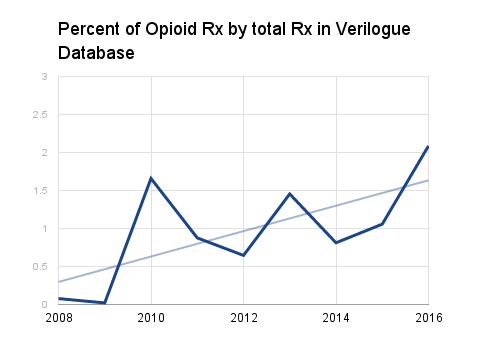The “opioid epidemic” is a growing problem in the United States. The state of Virginia declared a public health emergency relating to abuse of such substances, Google search data shows a higher rate of searches for the heroin treatment Suboxone than for any other prescription drug in the US, and new articles and studies are published daily covering this issue.
When doing a search within the Verilogue database across time, we found that nearly 10% of adult patients’ prescriptions reported by specialists (any physician in our database other than a primary care physician, internist, or family practitioner) is an opioid drug. This may not seem like a huge number, but when you consider all of the possible treatments for all of the possible conditions a patient may be suffering from, 10% is actually pretty significant.
This incidence has also increased over time. Looking at just the top prescribed opioid treatments (in this case, we use Norco, Percocet, Oxycodone, and Vicodin in our search), you can see a gradual increase since 2008:

The percent of specialist-reported prescriptions for 2016 is just over 2%, but this is up from 0.08% in 2008, showing a significant increase over time. Keep in mind as well that this is just for the most frequent opioid treatments as reported in our database, and may not reflect prescriptions written for the same patients by other physicians.
What’s being done?
Due to the ongoing issue regarding opioid prescription and abuse in the US, there have been numerous attempts at curbing the negative health outcomes. Initiatives including opioid use contracts (in some offices), physician education programs, and pushes to limit prescription to “drug seekers” show strides being made.
How well are these programs working?
Despite these well-meaning programs and initiatives, the epidemic continues to spread. Most of these efforts are top-down, with governing bodies making decisions about how to curtail the opioid issue. But how well do they actually permeate those affected on the front lines?
Physicians may try to set good use expectations for patients starting on opioid painkillers, but the extent to which patients are educated about the risks of opioid abuse may still be lacking. Only 5% of discussions in the Verilogue database with mention of “opioid”, “narcotic” or “painkiller” also include use of terms “abuse” or “addiction”, suggesting a missed opportunity to help patients understand the risks associated with such medications. What’s more, those discussions that do include some expectation-setting may be unfortunately vague:
DR: However, you have to be very careful with it. Uh, don’t abuse it. Don’t take more than I prescribe. Uh, watch out for side effects.
What does it all mean?
Nearly every one of us has been personally affected by a friend or loved one who experiences the struggle of opioid addiction. While many efforts are currently in place to help resolve this problem, most rely on top-down education to help reduce dependency and addiction. Perhaps a more bottom-up approach, starting with patients and their healthcare providers, can help. Once patients truly understand the risks, they can start taking an active role in care and prevention, without reducing the benefits of pain management that many desperately need.

